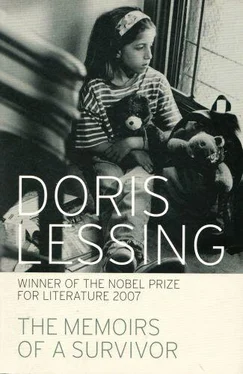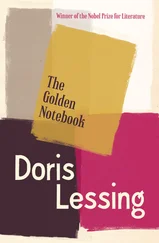This was how the picture looked to officialdom, doing as well as it could; how it looked in reports; how a newspaper, choosing the Ryans out of so many because of this quality they had of being more visible than others, presented them. Below the Poverty Line and Lower this was called. A book recording a dozen cases, the Ryans among them, was: Rejects of the Affluent Society. A young man just out of university whose aunt was a welfare worker on the case, had collected notes for a book, The Barbarians We Make, comparing the Ryans to those who pulled down Rome from its heights.
The Ryans…
How about the Ryan house, for a start? Well, it was filthy, and what furniture it had fit for a rubbish dump. Nothing on the bare floors but dirt, a bone, a plate of rancid cat's food: dogs and cats, like children, were fed impulsively. There was never much heat, so the thirteen Ryans and their friends — the Ryans attracted others and kept them in orbit — were always in one room, huddling. The parents were usually drunk and sometimes the children were, too. The friends were of all colours, and often remarkable, with lives out of the ordinary, and they all sat about, eating biscuits or chips and talking, talking; but sometimes the mother or an older girl cooked up some potatoes with a bit of meat, or opened some tins of something, and it became a festival. Chips and sweet drinks and tea with six or eight spoons of white sugar to each cup — such was the diet of the Ryans, so they were always listless, or on some unnatural peak of vitality while the sugar jigged in their arteries. They sat and talked and talked; the room was lively with that perpetually renewed chronicle, The Ryans Against the World. How the three middle children had been set on in the playground by a rival gang or family, but had won; or how the welfare woman had left a piece of paper saying that the fifth child, Mary, had to go to the clinic on Wednesday, and really must try to remember this time, for her rash ought to be attended to; how Paul had found a car unlocked and had taken — whatever was there, because it was there. Two of the girls had visited a chain store and had come back with twenty small plastic purses, two pounds of coffee, gardening shears, some spices from the Indian shelf, and six plastic cullenders. These articles would lie about unused, or might be bartered for other objects: the thieving was for the sake of the act, not of possession. The black girl Tessa, Ruth's friend, and Tessa's brother, and Ruth's other friend Irene and her sister had watched the television all the afternoon in one of the friendly television shops on the main street which did not chase away children who sidled in for an afternoon's free viewing — the Ryans' set was always broken. Stephen had met a dog on the street, and had gone to the canal and thrown sticks for the dog and the dog was ever so clever, it brought back three, no five, even six sticks at once… they talked, they talked; they drank and made their day, their lives, through vivid shrewd comment; and when they went to bed, it was three, four, six in the morning — but they did not undress, no one in that house undressed to go to bed, for it was never bedtime. A child would drop off where he sat, on his sister's lap, and stay there asleep, or be set down on the floor on a coat. By morning the four beds of the house each had three or four bodies in them, with the dogs and cats, all close together, warm, warming, protecting. No one got up till ten, eleven, mid-afternoon: if a Ryan found a job, he or she lost it in a week, because it was impossible to get up on time.
They lived on welfare, unless Mr Ryan aroused himself, became sober, and found a job: he was a carpenter. Then money flowed in, and they got clothes and shoes. These garments were worn communally, for no one owned this jersey or that dress. Children wore what fitted and what lay nearest. New clothes might easily be in rags the day after they arrived in the house, for some reason or another.
The children went on a 'job' when the mood took them — which was often. June, the thin sweet-faced little girl, was leader from the age of about seven. Four or five children would slide their way into a flat or a shop and emerge with — money? No, not so, that was not the point; or if it was money, then their pockets would be stacked for days with wads of notes which would fall out or be given away or 'lifted' by someone else. No, they were more likely to return with a marble table lamp, a stack of coffee tables which they had seen on a television advertisement and fancied the look of, a mirror with a pink plastic frame, and cigarettes — which last were valued and instantly shared out.
The point was, the goal of the saints and philosophers was theirs by birthright: The Way of the Ryans, it might be called. Each day, each experience, was sufficient unto itself, each act divorced from its consequences. 'If you steal that you will have to go to prison.' 'If you don't eat properly you will suffer from vitamin deficiencies.' 'If you spend that money now there won't be any to pay the rent on Friday.' These truths, always being presented to them by the officials in and out of the house, could never stay in a Ryan head.
And surely the priests and spiritual preceptors were abashed? To be attached to property is bad? What property? A Ryan had none, not even a shirt or a comb. To be the slave to habit is a chain? What habits — unless to have none is a habit of a kind. Regard they neighbour as thyself? — This grace of the very poor was theirs: within the clan which was the Ryans and their friends, white black and brown, who came and went day and night in and out of the house, was infinite giving and tolerance, was a generosity of judgement, a delicacy of understanding not given to many more fortunate people, or at least not without hard jostling with event and circumstance.
One ought not to care for appearances? — It was a long time since the Ryans had been able to afford this luxury.
One ought not to be puffed up, should not stand upon one's rights, should be humble and non-demanding? — Five minutes in the Ryan household would have any middleclass person indignantly on the telephone to his lawyer.
Feckless and irresponsible, hopeless, futureless, uneducated and ineducable — if they could read and write their names they did well; debased and depressed and depraved — but what could you expect when four or five people of any sex or age slept together in one bed? — dirty, unhealthy, louse — ridden and limp with bad feeding when they weren't on a momentary 'high'… in short and to be done with it, everything that our old society regarded as bad the Ryans were. Everything that our old society aimed at the Ryans did not even attempt, they had opted out, it was all too much for them.
The poor Ryans, doomed and damned; the dangerous Ryans, such a threat to us all, to our ways of thinking; the lucky Ryans, whose minute-by-hour life, communal and hugger — mugger, seemed all enjoyment and sensation: they liked being together. They liked each other.
When the bad times started, or rather, were seen to be starting, a very different thing, the Ryans and all the others like them were suddenly in a different light. First of all — but of course, this is a sociological cliche, some of the boys found places in the police or one of the many military or semi — military organisations that sprang up. And then, it was these people who took most easily to the hand-to-mouth life in the wandering tribes: nothing very much had changed for them, for when had they not been on the move, from room to broken — down house to council flat to hostel in a squatters' street? They ate badly? They were eating better and more healthily now than when civilisation had fed them. They were ignorant and illiterate? They were surviving capably and with enjoyment, which was more than could be said of so many of the middle — class people, who either lived on pretending nothing was really happening, only a reorganisation of society; or who faded away in a variety of ways, not able to bear an existence where respectability and gain could no longer measure the worth of a person.
Читать дальше
Конец ознакомительного отрывка
Купить книгу












